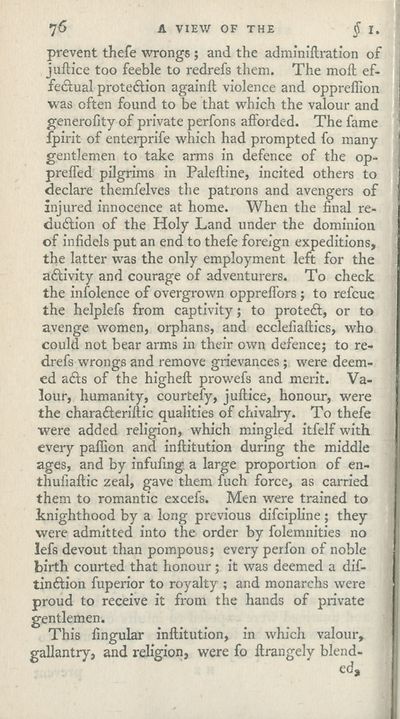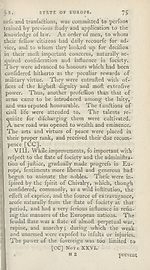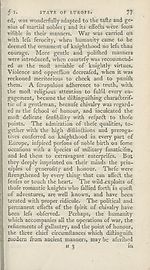Download files
Complete book:
Individual page:
Thumbnail gallery: Grid view | List view

A VIEW OF THE
76
§ I-
prevent thefe wrongs ; and the adminiftration of
juft ice too feeble to redrefs them. The moft ef-
fe&ual proteftion againft violence and oppreflion
was often found to be that which the valour and
generofity of private perfons afforded. The fame
fpirit of enterprife which had prompted fo many
gentlemen to take arms in defence of the op-
preffed pilgrims in Paleftine, incited others to
declare themfelves the patrons and avengers of
Injured innocence at home. When the final re-
duddion of the Holy Land under the dominion
of infidels put an end to thefe foreign expeditions,
the latter was the only employment left for the
activity and courage of adventurers. To check
the infolence of overgrown oppreffors ; to refcue
the helplefs from captivity; to protecd, or to
avenge women, orphans, and ecclefiaftics, who
could not bear arms in their own defence; to re¬
drefs wrongs and remove grievances ; were deem¬
ed adfs of the highefl prowefs and merit. Va¬
lour, humanity, courtefy, juflice, honour, were
the charafieriitic qualities of chivalry. To thefe
were added religion, which mingled itfelf with
every paffion and inftitution during the middle
ages, and by infufing a large proportion of en-
thufiaftic zeal, gave them fuch force, as carried
them to romantic excefs. Men were trained to
knighthood by a long previous difcipline; they
were admitted into the order by folemnities no
lefs devout than pompous; every perfon of noble
birth courted that honour; it was deemed a dif-
tinftion fuperior to royalty ; and monarchs were
proud to receive it from the hands of private
gentlemen.
This fingular inflitution, in which valour,
gallantry, and religion, were fo ilrangely blend¬
ed.
76
§ I-
prevent thefe wrongs ; and the adminiftration of
juft ice too feeble to redrefs them. The moft ef-
fe&ual proteftion againft violence and oppreflion
was often found to be that which the valour and
generofity of private perfons afforded. The fame
fpirit of enterprife which had prompted fo many
gentlemen to take arms in defence of the op-
preffed pilgrims in Paleftine, incited others to
declare themfelves the patrons and avengers of
Injured innocence at home. When the final re-
duddion of the Holy Land under the dominion
of infidels put an end to thefe foreign expeditions,
the latter was the only employment left for the
activity and courage of adventurers. To check
the infolence of overgrown oppreffors ; to refcue
the helplefs from captivity; to protecd, or to
avenge women, orphans, and ecclefiaftics, who
could not bear arms in their own defence; to re¬
drefs wrongs and remove grievances ; were deem¬
ed adfs of the highefl prowefs and merit. Va¬
lour, humanity, courtefy, juflice, honour, were
the charafieriitic qualities of chivalry. To thefe
were added religion, which mingled itfelf with
every paffion and inftitution during the middle
ages, and by infufing a large proportion of en-
thufiaftic zeal, gave them fuch force, as carried
them to romantic excefs. Men were trained to
knighthood by a long previous difcipline; they
were admitted into the order by folemnities no
lefs devout than pompous; every perfon of noble
birth courted that honour; it was deemed a dif-
tinftion fuperior to royalty ; and monarchs were
proud to receive it from the hands of private
gentlemen.
This fingular inflitution, in which valour,
gallantry, and religion, were fo ilrangely blend¬
ed.
Set display mode to:
![]() Universal Viewer |
Universal Viewer | ![]() Mirador |
Large image | Transcription
Mirador |
Large image | Transcription
| Antiquarian books of Scotland > Kings & rulers > History of the reign of the Emperor Charles V. > Volume 1 > (94) |
|---|
| Permanent URL | https://digital.nls.uk/109183459 |
|---|
| Description | By William Robertson. London : Cadell and Davies, 1798. |
|---|---|
| Shelfmark | ABS.1.76.13 |
| Additional NLS resources: | |
| Description | Thousands of printed books from the Antiquarian Books of Scotland collection which dates from 1641 to the 1980s. The collection consists of 14,800 books which were published in Scotland or have a Scottish connection, e.g. through the author, printer or owner. Subjects covered include sport, education, diseases, adventure, occupations, Jacobites, politics and religion. Among the 29 languages represented are English, Gaelic, Italian, French, Russian and Swedish. |
|---|

